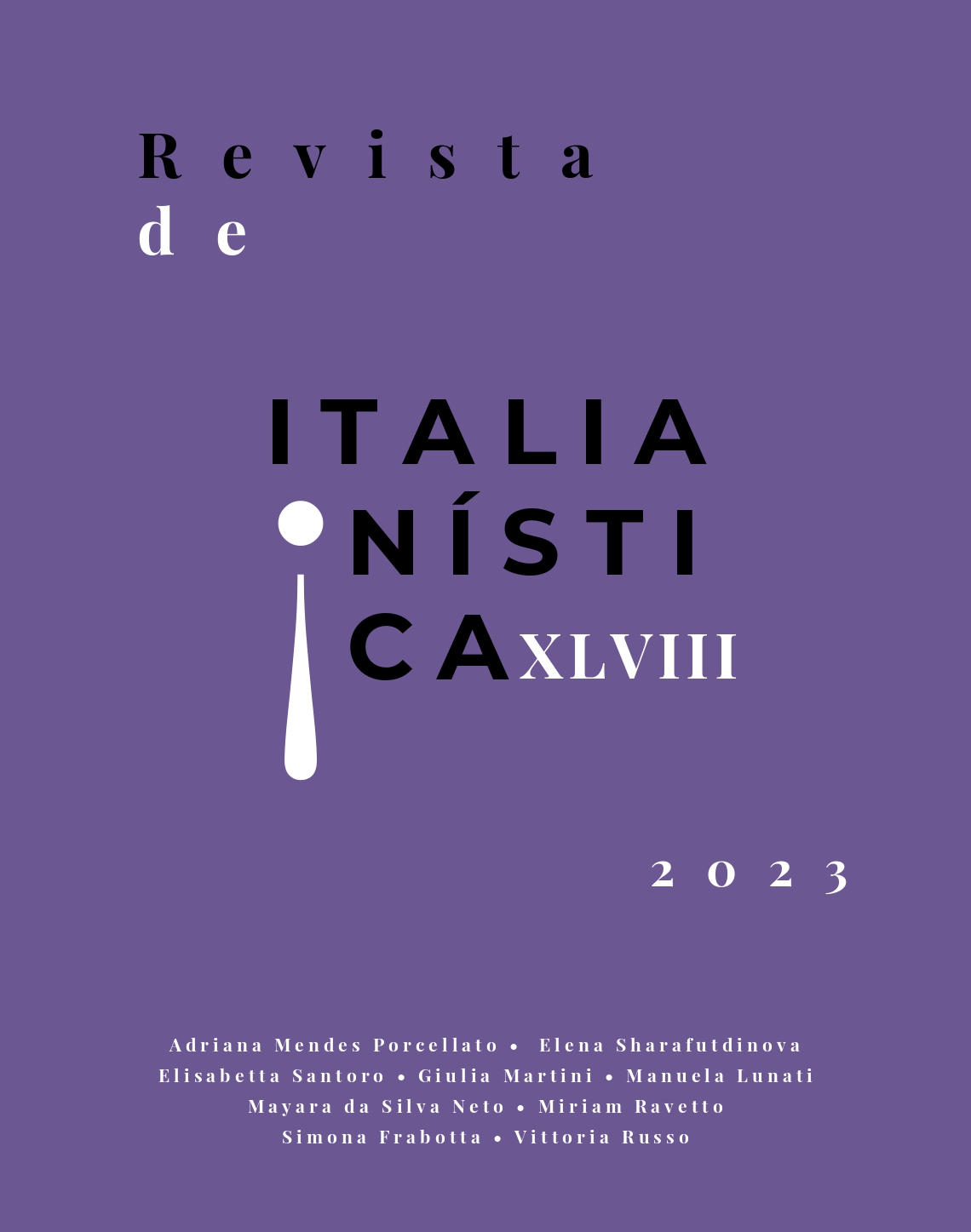Richieste in italiano e portoghese brasiliano: da uno studio contrastivo alla riflessione sull'interculturalità
DOI:
https://doi.org/10.11606/issn.2238-8281.i48p64-94Keywords:
Requests, Italian, Brazilian Portuguese, Discourse Completion Task, InterculturalityAbstract
The Research Group “Pragmática (inter)linguística, cross-cultural e intercultural” (CNPq/Fapesp/USP) is conducting a cross-cultural investigation focused on requests and how they are carried out in different languages and cultures, in order to identify similarities and differences and to reflect on how they may interfere in interactions between speakers. Widely studied, the request was chosen for at least two reasons: (a) it is one of the most frequent speech acts; (b) it is strongly influenced by contextual and cultural factors. These factors gain particular relevance when one considers that it is a Face-Threatening Act (BROWN; LEVINSON, 1987), since with a request one seeks to induce the interlocutor to perform an action (SEARLE, 1979) and thus brings into play both the positive face of the one making it and the negative face of the one receiving it. In fact, on the one hand, a rejection can frustrate the need to be acknowledged and approved, and on the other hand, having to react to a request can hinder one’s individual freedom. The data analyzed in this article were collected through one of the instruments used by the group: a Written Discourse Completion Task (WDCT), which contains everyday life situations that induce the realization of a request. Participants are asked to write what they would say if they found themselves in the proposed situations, which were elaborated by taking into account social distance and degree of imposition, two of the contextual variables proposed by Brown and Levinson (1987). The results presented here are based on two samples of 30 Italians and 30 Brazilians. The analysis focuses on the characteristics of head acts and some types of supportive moves (BLUM-KULKA et al., 1989), as well as on how recurrent expressions may be a sign of conventionality in each of the two target languages, considering particularly how the knowledge of these pragmatic features can influence intercultural communication dynamics.
Downloads
References
AUSTIN, J. L. How to do things with words. London: Oxford University Press, 1962.
BARTALI, V. Request realisation strategies in Italian: The influence of the variables of Distance and Weight of Imposition on strategy choice. Lodz Papers in Pragmatics, 18.1, 2022, p. 55–90. DOI: https://doi.org/10.1515/lpp-2022-0003
BLUM-KULKA, S.; HOUSE, J. J.; KASPER, G. Cross-Cultural Pragmatics: Requests and Apologies. Norwood, New Jersey: Alex Publishing Corporation, 1989.
BLUM-KULKA, S. The Metapragmatics of Politeness in Israeli Society. In Watts, R. et al. (Eds.) Politeness in Language: Studies in its History, Theory, and Practice. Berlin: Mouton de Gruyter, 1992.
BRIZ, A.; ALBELDA, M. Una propuesta teórica y metodológica para el análisis de la atenuación lingüística en español y portugués. La base de un proyecto en común (ES.POR.ATENUACIÓN), ONOMÁZEIN 28, 2013, p. 288 - 319.
BROWN, P.; LEVINSON, S. Politeness: Some Universals in Language Use. 2a ed. Cambridge: Cambridge University Press, 1987.
CAFFI, C. La mitigazione. Un approccio pragmatico alla comunicazione nei contesti terapeutici. Muenster, LIT, 2001.
CAFFI, C. Pragmatica: sei lezioni. Roma: Carocci, 2009.
GOFFMAN, E. Ritual de Interação: ensaios sobre o comportamento face a face. Trad. F. Rodrigues Ribeiro da Silva. Petrópolis: Vozes. (Titolo originale: Interaction Ritual: essays on face-to-face behavior. New York: Garden City), 2011 [prima edizione: 1967]. GOLATO, A. Studying Compliment Responses A Comparison of DCTs and Recordings of Natural Occurring Talk. Applied Linguistics, 24, 2003, 90-121. DOI:https://doi.org/10.1515/text.1.21.1-2.187
KERBRAT-ORECCHIONI, C. Les actes de langage dans le discours. Théorie et fonctionnement. Paris: Nathan, 2001.
NUZZO, E. Imparare a fare cose con le parole. Richieste, proteste, scuse in italiano lingua seconda. Perugia: Guerra Edizioni, 2007.
PORCELLATO, A. M.; SPADOTTO, L. do N.; SILVA NETO, M. da. Dalla ricerca alla didattica: proposte per promuovere la consapevolezza metapragmatica e la competenza interculturale nell’insegnamento di italiano L2 ad apprendenti brasiliani. Revista de Italianística, 44, 135-161, 2022. DOI: https://doi.org/10.11606/issn.2238-8281.i44p135-161.
SANTORO, E. Richieste e attenuazione: un confronto tra italiano e portoghese brasiliano. Normas, vol. 7, n. 2, 2017, p. 179-204. DOI: 10.7203/Normas.v7i2.11173
SANTORO, E.; PORCELLATO, A. M. Língua, cultura e cognição: um estudo do ato de fala do pedido em italiano, português brasileiro, espanhol argentino e alemão. PERcursos Linguísticos, v. 10, n. 26, 2020 p. 49-71. DOI: https://doi.org/10.47456/pl.v10i26.33412
SANTORO, E.; PORCELLATO, A. M. Escolhas linguísticas e valores culturais na construção interacional de pedidos de brasileiros e italianos. Linguagem em (dis)curso 22 (3), Set-Dez 2022. DOI: https://doi.org/10.1590/1982-4017-22-03-465-482
SANTORO, E.; SILVA, L. A.; KULIKOWSKI, M. Z. Estudar pedidos na perspectiva da Pragmática cross-cultural. In: SANTORO, E.; SILVA, L.A; Kulikowski, M. Z. (a cura di.) Estudos em Pragmática: atos de fala em português, italiano, espanhol e inglês. São Paulo: Portal de Livros Abertos da USP, 2021, p. 13-36.
SBISÀ, M. Linguaggio, ragione e interazione: per una pragmatica degli atti linguistici. Edizione digitale: Edizioni Università di Trieste, 2009 [prima edizione: 1989].
SCHALKOSKI-DIAS, L; GODOY, E. Supportive moves in requests and orders in Brazilian portuguese and Uruguayan spanish variant. Acta Scientiarum. Language and Culture, vol. 40, 2018. DOI: https://doi.org/10.4025/actascilangcult.v40i1.36434.
SEARLE, J. Expression and Meaning. Studies in the Theory of Speech Acts. Cambridge: Cambridge University Press, 1979.
THOMAS, J. Cross-Cultural Pragmatic Failure. Applied Linguistics, 4, 1983, p. 91-112. DOI: https://doi.org/10.1093/applin/4.2.91.
Downloads
Published
Issue
Section
License
Copyright (c) 2023 Revista de Italianística

This work is licensed under a Creative Commons Attribution-NonCommercial-NoDerivatives 4.0 International License.
A revista retém os direitos patrimoniais dos artigos e os publica simultâneamente sob uma Licença Creative Commons-Atribuição-Não Comercial-Sem Derivações.
How to Cite
Funding data
-
Fundação de Amparo à Pesquisa do Estado de São Paulo
Grant numbers 2022/05865-9



